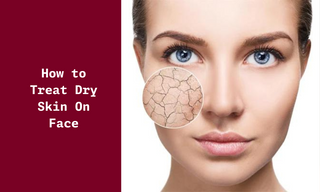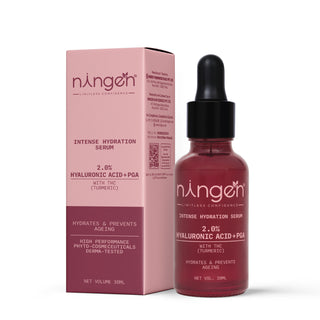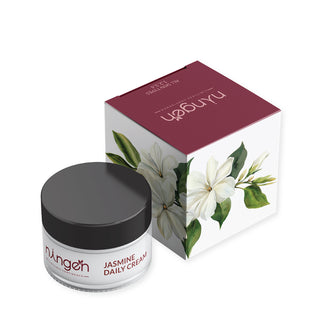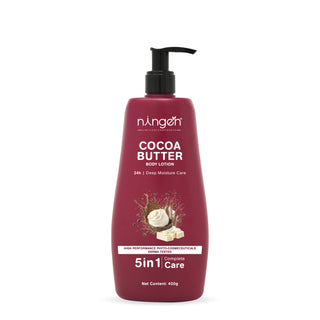Dry skin on your face can be a real bother, causing discomfort and making your face feel tight, and itchy and can lead to premature aging. It's like your skin is asking for some extra love to be at its best version!
But don't worry – you're not alone, and there are simple ways to fix it.
In this blog, we'll discuss why dry skin happens, the easy things you can do to help, the best products to use, and we’ll deep dive a little more about prevention.
So, if your face is feeling a bit like a desert, keep reading how to treat dry skin on face for some super helpful tips to bring back that happy, healthy feeling to your skin!
How Do You Know You Have Dry Skin?
You can tell your skin is dry if it feels tight, rough, or itchy. Dry skin may look dull, flaky, or red. Sometimes, you might see fine lines or wrinkles. After washing, if your skin feels tight, that's a sign too. Dry skin can also crack or peel.
The key is to keep your skin hydrated. Using a good moisturizer helps a lot. Look for products with nourishing ingredients to make your skin soft and comfortable again. Taking care of your skin with the right products can restore its natural smoothness and stop discomfort.
Causes of Dry Skin
Dry skin is a common issue that can happen for different reasons. Knowing these causes can help you take care of your skin better:
- Low Humidity: When the air doesn't have much moisture, especially in colder months or dry places, it can make your skin dry and flaky.
- Indoor Heating: During cold times, heaters inside can take away moisture from the air, making your skin lose its natural oils.
- Weather Conditions: Spending time in dry or windy weather can also make your skin lose moisture.
- Excessive Bathing: Using hot water and strong soaps when you bathe can take away the natural oils from your skin, making it dry and irritated.
- Chlorinated Pools: Swimming a lot in pools with chlorine can also make your skin dry.
- Lifestyle Habits: Smoking, drinking too much alcohol, and not eating well can affect how your skin keeps moisture, leading to dryness and flakiness.
- Genetic Predisposition: Some people inherit a tendency to have naturally drier skin from their family.
Understanding these causes and taking steps to prevent and treat them can help you keep your skin smooth, hydrated, and healthy.
How to Treat Dry Skin On Face
Simple Lifestyle Changes: Hydration from Inside Out
- Drink Plenty of Water: Hydration starts from within. Aim for at least eight glasses of water daily to keep your skin and body well-hydrated.
- Healthy Diet: Include foods rich in omega-3 fatty acids (like salmon and walnuts), fruits, vegetables, and whole grains. These nourishing foods support skin health.
- Humidifier: Especially during dry seasons, using a humidifier in your room adds moisture to the air, preventing your skin from drying out.
Skincare Routine: Your Defense Against Dryness
- Gentle Cleansing: Use a mild, hydrating cleanser to clean your face. Avoid harsh soaps that can strip away natural oils.
- Exfoliate Occasionally: Dead skin cells can contribute to dryness. Exfoliate gently, 1-2 times a week, using a mild scrub or exfoliating mask.
- Hydrating Moisturizer: Invest in a good-quality moisturizer with ingredients like hyaluronic acid, glycerin, and shea butter. Apply it immediately after cleansing to lock in moisture.
- Sun Protection: UV rays can worsen dry skin. Use a broad-spectrum sunscreen with at least SPF 30 daily, even on cloudy days.
Professional Help: When to Consult a Dermatologist
Persistent dry skin may require professional attention. If your dryness is severe, accompanied by redness, itching, or flakiness, it's time to consult a dermatologist. They can identify underlying issues and recommend specialized Ingredients that help treatments or prescription medications if needed.
Ingredients that help
Dry skin can benefit from the nourishing and hydrating properties of various ingredients. Incorporating these into your skincare routine can help alleviate dryness and promote a healthier complexion:
Hyaluronic Acid: Known for its excellent moisture retention, it hydrates the skin by attracting and holding water molecules, providing a plump and moisturized feel.
Glycerin: A humectant that draws moisture to the skin, glycerin helps maintain hydration levels, preventing dryness and promoting a smoother texture.
Ceramides: These lipids help strengthen the skin's natural barrier, reducing water loss and enhancing moisture retention, which is crucial for combating dryness.
Shea Butter: A rich emollient, shea butter is high in fatty acids and vitamins, offering deep hydration and soothing properties to dry and irritated skin.
Aloe Vera: Known for its calming properties, aloe vera not only soothes dry skin but also provides hydration, promoting a more balanced complexion.
Olive Oil: Packed with antioxidants and fatty acids, olive oil acts as an excellent emollient, moisturizing the skin and restoring its natural suppleness.
Vitamin E: An antioxidant that helps protect the skin from free radicals, Vitamin E also supports moisture retention and promotes a smoother skin texture.
Oat Extract: Oats contain beta-glucans, which have anti-inflammatory properties and help soothe dry, itchy skin while providing hydration.
Jojoba Oil: Similar to the skin's natural oils, jojoba oil is a lightweight moisturizer that helps balance oil production and prevent dryness.
Alpha Hydroxy Acids (AHAs): AHAs, like glycolic acid, can exfoliate dead skin cells, allowing moisturizing ingredients to penetrate better and promoting a more radiant complexion.
Incorporating products with these ingredients into your skincare routine can contribute to treating and preventing dry skin, leaving your skin feeling nourished, hydrated, and revitalized.
Note: Read our other article to know more about how to get rid of dry skin.
How Does Hyaluronic Acid Work to Prevent Dry Skin?
Hyaluronic acid works to prevent dry skin through its exceptional ability to attract and retain moisture. Here's how it contributes to keeping the skin hydrated and preventing dryness:
Hydration Retention: Hyaluronic acid is a humectant, which means it attracts and holds onto water molecules. When applied to the skin, it draws moisture from the environment and the deeper layers of the skin, helping to keep it well-hydrated.
Moisture Infusion: Hyaluronic acid can penetrate the outer layers of the skin, reaching the epidermis and dermis. Once absorbed, it starts to draw water into these layers, effectively infusing the skin with moisture.
Water Binding: Hyaluronic acid has a unique ability to bind with water molecules. It can hold a significant amount of water relative to its weight, contributing to the skin's ability to retain moisture and prevent water loss.
Plumping Effect: As hyaluronic acid attracts and holds water, it creates a plumping effect in the skin. This not only helps reduce the appearance of fine lines and wrinkles but also gives the skin a fuller and more supple look.
Balancing Hydration: Hyaluronic acid is suitable for various skin types, including both dry and oily skin. It provides hydration without feeling heavy or greasy, making it an ideal ingredient to balance the skin's moisture levels.
Supporting Skin Barrier Function: By maintaining optimal hydration levels, hyaluronic acid supports the skin's natural barrier function. A healthy skin barrier helps prevent moisture loss, protects against environmental stressors, and keeps the skin's surface smooth and intact.
Enhancing Skin Elasticity: Well-hydrated skin is more elastic and resilient. Hyaluronic acid contributes to skin firmness and elasticity, promoting a youthful and revitalized appearance.
In summary, hyaluronic acid's moisture-retaining properties make it an effective ingredient in preventing dry skin. By infusing the skin with hydration, improving water retention, and supporting overall skin health, hyaluronic acid contributes to a smoother, more supple complexion.
If you're looking for skincare essentials for dry skin, please check out our related product section below.
Conclusion
Thank you for reading this article about how to treat dry skin on face. Hope you found this helpful. Treating dry skin on your face is about finding a routine that works for you. By understanding the causes and incorporating simple changes into your lifestyle and skincare routine, you can say goodbye to dryness and hello to a radiant, happy face. Experiment with different products, stay consistent and watch your skin transform into the glowing masterpiece it deserves to be.
Embrace Your Healthy, Hydrated Glow! Every day!










